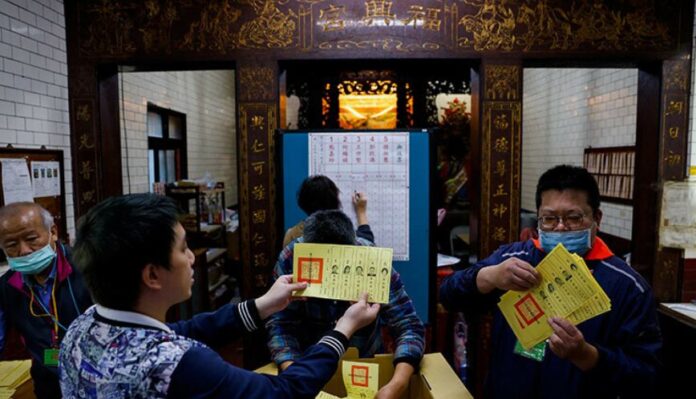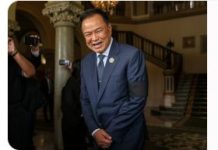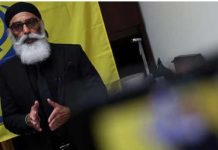Millions of Taiwanese voted for a new president in the face of threats from China that choosing the wrong leader could set the stage for war on the self-ruled island.
Beijing slammed frontrunner Lai Ching-te, the current vice president, as a dangerous “separatist” in the days leading up to the poll, and on the eve of the vote, its defence ministry vowed to “crush” any move towards Taiwanese independence.
China claims self-ruled Taiwan, separated from the mainland by a 180-kilometre strait, as its own and says it will not rule out using force to bring about “unification”, even if conflict does not appear imminent.
Voting began at 8am at nearly 18,000 polling stations across the island with almost 20 million people eligible to cast ballots, and will end at 4pm.
In a Taipei school, 54-year-old professor Karen was the first in line to enter a polling booth.
“I looked into the ballot box and felt that I’ve never been as excited as this moment, because there is one candidate I believe who can bring hope to the future of Taiwan,” she told AFP.
Voter Huang Pei-ya said every Taiwanese should exercise their right to cast a ballot.
“I don’t like those saying they are not interested in politics, don’t know who to vote for, or they don’t want to vote,” the stock exchange worker told AFP.
“I think we should care about our country, our life and come out to vote.”
Taiwan has strict election laws that effectively prevent media from asking voters about their specific choices on polling day.
People react as they gather near the Democratic Progressive Party (DPP) headquarters on the day of the presidential and parliamentary elections in Taipei, Taiwan on January 13. — Reuters
‘Hard-won democracy’
Results are expected Saturday evening, with the outcome watched closely from Beijing to Washington — the island’s main military partner — as the two superpowers tussle for influence in the strategically vital region.
During a raucous campaign, Lai, of the Democratic Progressive Party (DPP), pitched himself as the defender of Taiwan’s democratic way of life.
“This is Taiwan’s hard-won democracy. We should all cherish our democracy and vote enthusiastically,” Lai told reporters as he voted in a school gymnasium in the southern city of Tainan.
His main opponent, Hou Yu-ih, of the opposition Kuomintang (KMT), favours warmer ties with China and accuses the DPP of antagonising Beijing with its stance that Taiwan is “already independent”.
KMT has said it will boost economic prosperity while maintaining strong relationships with international partners, including the United States.
“I hope that no matter how turbulent it was during the election process, everyone will unite after the poll to face Taiwan’s future,” Hou told reporters after voting in New Taipei City.
Taiwan bans the publishing of polls within 10 days of elections, but political observers say the 64-year-old Lai is expected to win the top seat, though his party is likely to lose its parliamentary majority.
The race has also seen the rise of the upstart populist Taiwan People’s Party (TPP), whose leader Ko Wen-je has drawn support with an anti-establishment offer of a “third way” out of the two-party deadlock.
China censorship
Located on a key maritime gateway linking the South China Sea to the Pacific Ocean, Taiwan is home to a powerhouse semiconductor industry producing precious microchips — the lifeblood of the global economy powering everything from smartphones to cars and missiles.
China has stepped up military pressure on Taiwan in recent years, periodically stoking worries about a potential invasion.
Chinese President Xi Jinping in a recent New Year’s address said the “unification” of Taiwan with China was “inevitable”.
As voters cast their ballots, AFP reporters spotted a fighter jet in the skies above the island of Pingtan, the nearest point in China to Taiwan’s main island.
The hashtag “Taiwan election” was among the top trending items on China’s social media platform Weibo before it was blocked at around 9:45am local time.
Chinese warplanes and naval ships probe Taiwan’s defences almost every day, and Beijing has in recent years also staged massive war games — simulating a blockade of the island and sending missiles into its surrounding waters.
The Chinese military said the night before the polls that it would “take all necessary measures to firmly crush ‘Taiwan independence’ attempts of all forms”.
Hours before the vote, US Secretary of State Antony Blinken met a senior Chinese official in Washington and stressed the importance of “maintaining peace and stability” across the Taiwan Strait.
Under Taiwanese law, President Tsai Ing-wen can not run again as she has served the maximum two terms.
As well as a president, voters will also elect lawmakers to Taiwan’s 113-seat legislature.

















